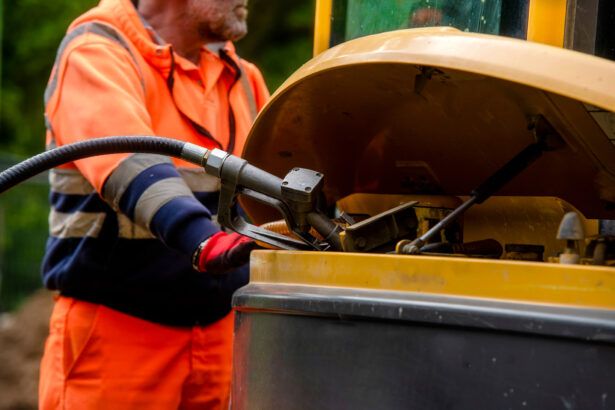
Effective fleet management is crucial for construction companies that aim to optimize operations, control costs, and ensure projects are completed on time and on budget. Fleet cards are powerful tools that offer advanced tracking capabilities that provide real-time insights into vehicle and driver activities. Fleet managers can effectively oversee and control their fleets by leveraging features such as real-time data monitoring, automated fuel expense tracking, comprehensive reporting and analytics, integrated accounting, mobile access, and telematics integration.
Real-time data monitoring is a cornerstone of modern fleet management, helping construction managers make informed decisions.
However, many construction companies that use fleet cards don’t maximize their potential. Let’s take a look at the basic functions of fleet fuel cards. Then, we’ll explore all their tracking potential.
Common Ways to use Fleet Cards
No matter what fuel card a construction company uses, they all have similar functions. At their most basic level, fleet cards function like a credit card. These cards are perfect for consolidating vehicle-related expenses like fuel, parts and services, and maintenance. Beyond being a payment method, most fleet cards include fuel rebates, and some include additional discounts. Valero fleet cards, for instance, offer up to 8¢ per gallon fuel rebates at Valero gas stations and discounts on hotels, tires, and auto parts.
Sadly, many business owners fail to take advantage of the additional features of fleet cards — ones that can lead to more efficient operations and potential savings.
Data Tracking Capabilities of Fleet Cards
There are many ways fleet cards can be used to track information pertinent to vehicle and driver performance.
Real-time Data Monitoring
Real-time data monitoring is a cornerstone of modern fleet management, helping construction managers make informed decisions. Fleet cards are equipped with real-time data capabilities, offering several advantages:
- Immediate transaction data: Monitor fuel purchases and other transactions as they occur, allowing for swift identification of unauthorized or suspicious activities.
- Enhanced cost control: By accessing up-to-date spending information, managers can quickly identify excessive or unnecessary expenditures and implement corrective measures.
- Improved compliance and accountability: Real-time monitoring helps ensure drivers adhere to company policies. Each transaction can be linked to a specific employee or vehicle, fostering a culture of responsibility.
Automated Fuel Expense Tracking
Managing fuel expenses is a significant aspect of fleet operations, and automation in this area can lead to substantial efficiencies. With all transaction data collected in real time, construction business owners can:
- Eliminate manual data entry: Automated tracking removes the need for drivers to collect receipts and submit expense reports, reducing administrative burdens.
- Ensure accurate data collection: Each fuel transaction is automatically recorded with details such as date, time, location, fuel type, and amount, ensuring accurate records.
- Streamline administrative processes: Automated data capture allows fleet managers to monitor fuel consumption patterns and identify anomalies easily without sifting through manual records.
Comprehensive Reporting and Analytics
In-depth reporting and analytics capabilities provided by fleet cards empower managers to gain valuable insights into fleet performance:
- Detailed transaction reports: Access comprehensive reports detailing fuel usage, vehicle performance, and driver behavior, enabling data-driven decision-making.
- Trend analysis: Identify patterns in fuel consumption, vehicle utilization, and maintenance needs to proactively address potential issues and optimize operations.
- Customized reporting: Generate reports tailored to specific metrics or time frames to focus on areas of interest or concern within the fleet.
In-depth reporting and analytics capabilities provided by fleet cards empower managers to gain valuable insights into fleet performance.
Leveraging these analytics allows for continuous improvement in fleet management strategies, which can lead to cost savings and enhanced operational efficiency.
Integrated Accounting

Most fleet cards come with a dashboard that houses all fleet card data. These dashboards communicate with bookkeeping and accounting software. Seamless integration of fleet card data with accounting systems simplifies financial management:
- Automatic data synchronization: Transaction data from fleet cards can be directly imported into accounting software, reducing manual data entry and the risk of errors.
- Simplified expense reconciliation: With detailed transaction records readily available, reconciling expenses becomes more straightforward and accurate.
- Enhanced financial oversight: Integrated systems provide a holistic view of fleet-related expenditures, aiding in budgeting and financial planning.
This integration ensures that financial records are up-to-date and accurate, supporting better financial decision-making and resource allocation.
Additional Tracking Capabilities
Beyond the direct functions of fleet cards, there are two additional means of tracking vehicles and drivers — mobile apps and telematics.
Mobile Access
Mobile apps like the free SmartHub app used by Valero help manage fleet operations on the go:
- Remote monitoring: Fleet managers can access real-time data, reports, and alerts from mobile devices, allowing for timely interventions regardless of location.
- Driver support: Mobile applications can assist drivers in locating preferred fueling stations, accessing their transaction history, and adhering to company policies.
- Enhanced communication: Mobile platforms facilitate better communication between drivers and managers, ensuring access to information and prompt resolution of issues.
Mobile access ensures that fleet management is not confined to the office, promoting flexibility and responsiveness in operations. This is particularly valuable in constructions where multiple sites and teams are managed.
Telematics Integration
Integrating telematics with fleet card systems provides a comprehensive view of fleet operations. These systems combine GPS tracking with onboard diagnostics so fleet managers have a complete picture of every vehicle.
- Vehicle tracking: Monitor vehicle locations, speeds, and routes in real-time, enhancing route planning and efficiency.
- Driver behavior monitoring: Assess driving habits such as acceleration, braking, and idling to promote safer and more fuel-efficient driving practices.
- Predictive maintenance: Utilize vehicle performance data to anticipate maintenance needs, reducing downtime and extending vehicle lifespan.
Telematics integration increases the data available to fleet managers, supporting informed decision-making and proactive management.
A Better Understanding of Operations
Fleet cards have advanced tracking capabilities, making them invaluable tools for construction companies aiming to optimize fleet management. Harnessing real-time data, automating expense tracking, utilizing comprehensive reporting, integrating with accounting systems, enabling mobile access, and incorporating telematics help fleet managers achieve greater control, efficiency, and cost savings.
To gain a better understanding of your construction company’s operations, consider adding a Valero fleet card to your management toolbox.